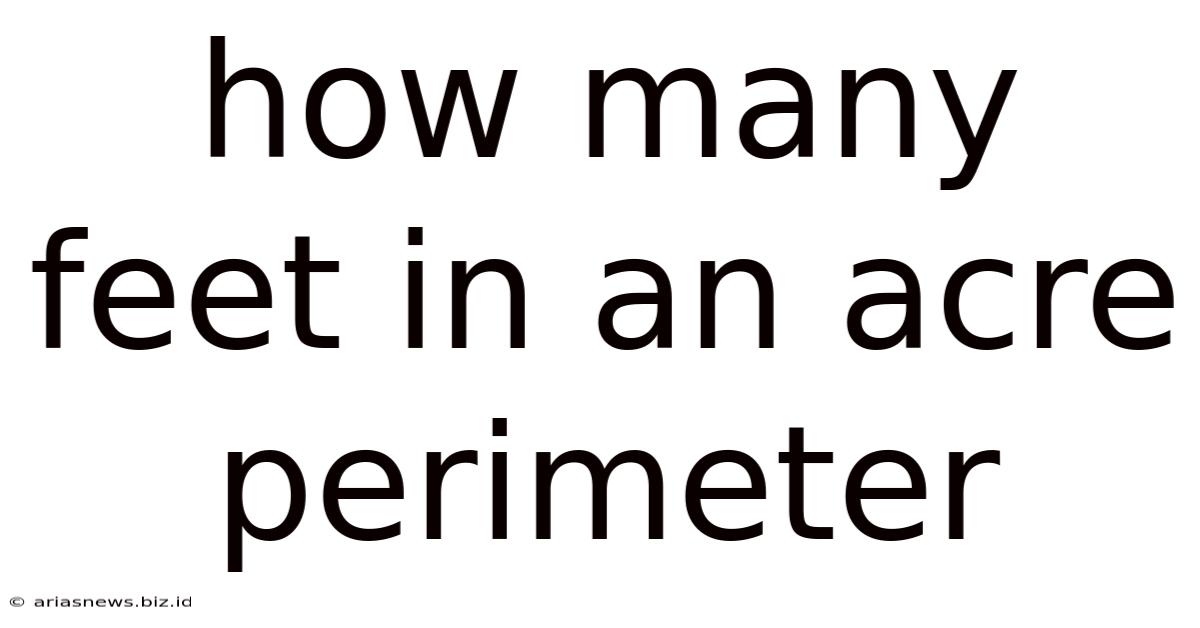How Many Feet In An Acre Perimeter
Arias News
May 09, 2025 · 4 min read

Table of Contents
How Many Feet Are in an Acre's Perimeter? It's Complicated!
The question, "How many feet are in an acre's perimeter?" doesn't have a single, simple answer. This is because an acre isn't a defined shape; it's a defined area. An acre can be a square, a rectangle, a circle, or any other shape imaginable, each with a drastically different perimeter. Understanding this fundamental point is crucial before we delve into the calculations.
Understanding Acres and Perimeters
Let's start with the basics:
-
Acre: An acre is a unit of land area equal to 43,560 square feet. It's a commonly used unit in the United States and some other countries for measuring land, particularly for properties like farms and ranches.
-
Perimeter: The perimeter of a shape is the total distance around its outer boundary. For a square, it's four times the side length. For a rectangle, it's twice the sum of the length and width. For a circle, it's its circumference (2πr, where r is the radius). The perimeter varies wildly depending on the shape.
Calculating Perimeter for Different Acre Shapes
To illustrate the variability, let's calculate the perimeters of a few common shapes with an area of one acre (43,560 square feet):
1. A Square Acre
A square acre would have equal sides. To find the side length, we take the square root of the area:
√43,560 square feet ≈ 208.71 feet
The perimeter of the square acre would be 4 * 208.71 feet = 834.84 feet.
2. A Rectangular Acre
Let's consider a rectangle with a length twice its width. Let's denote the width as 'w'. Then the length would be '2w'. The area would be:
w * 2w = 2w² = 43,560 square feet
Solving for 'w':
w² = 21,780 w ≈ 147.6 feet
Therefore, the length would be approximately 295.2 feet.
The perimeter of this rectangular acre would be 2 * (147.6 + 295.2) feet = 885.6 feet.
Notice that even a simple change in shape significantly alters the perimeter.
3. A Circular Acre
Calculating the perimeter (circumference) of a circular acre requires a different approach. The area of a circle is πr², where 'r' is the radius. Therefore:
πr² = 43,560 square feet
Solving for 'r':
r² = 43,560 / π r ≈ 117.75 feet
The circumference (perimeter) is 2πr:
2π * 117.75 feet ≈ 739.34 feet.
This demonstrates that even with the same area (one acre), the perimeter varies considerably depending on the shape.
The Importance of Shape in Land Measurement
The examples above highlight a crucial point: knowing the area (acreage) alone doesn't tell you the perimeter. The shape of the land significantly influences the perimeter length. This has practical implications:
-
Fencing Costs: The cost of fencing a property directly relates to its perimeter. A longer perimeter means more fencing material and increased labor costs.
-
Drainage and Irrigation: The perimeter affects how water flows across the land, influencing the design of drainage systems and irrigation networks.
-
Accessibility and Transportation: A longer perimeter might mean longer distances to travel within the property, impacting accessibility and transportation of goods or materials.
-
Property Value: The shape and perimeter of the land can influence its overall value, as factors like ease of access and usability affect perceived worth.
Irregularly Shaped Acres: The Real-World Complexity
Most real-world properties aren't perfect squares, rectangles, or circles. They often have irregular boundaries due to natural features like rivers, hills, and roads. Calculating the perimeter of such properties requires more advanced methods, often using surveying techniques and specialized software. These techniques involve breaking down the irregular shape into smaller, simpler shapes (like triangles or trapezoids), calculating their individual perimeters, and then summing them up to find the total perimeter.
Estimating Perimeter for Irregular Shapes
For a rough estimate of the perimeter of an irregularly shaped acre, one could use methods like:
-
Using a map and measuring tool: Measure the distance around the property's boundary on a detailed map using a measuring tool or software.
-
Walking the perimeter: Physically walk the perimeter of the land and use a measuring device like a measuring wheel to record the distance.
These methods provide approximations, not precise calculations, especially for complex shapes.
Conclusion: It's All About the Shape!
The question of how many feet are in an acre's perimeter doesn't have a definitive answer. The perimeter is entirely dependent on the shape of the one-acre parcel. Understanding this distinction is vital for accurately assessing the characteristics and potential applications of a piece of land. Whether planning fencing, irrigation, or other land-use activities, considering the actual shape and its resulting perimeter is crucial for realistic budgeting, effective design, and informed decision-making. Don't let the simplicity of the "acre" unit mislead you; the reality of land measurement is much more nuanced.
Latest Posts
Latest Posts
-
The Sum Of A Number And 4
May 10, 2025
-
How Much Land Is In A Quarter Section
May 10, 2025
-
How Do You Say Michael In Italian
May 10, 2025
-
Something You Wear That Starts With An M
May 10, 2025
-
How Do You Say Do You Eat Bread In Spanish
May 10, 2025
Related Post
Thank you for visiting our website which covers about How Many Feet In An Acre Perimeter . We hope the information provided has been useful to you. Feel free to contact us if you have any questions or need further assistance. See you next time and don't miss to bookmark.